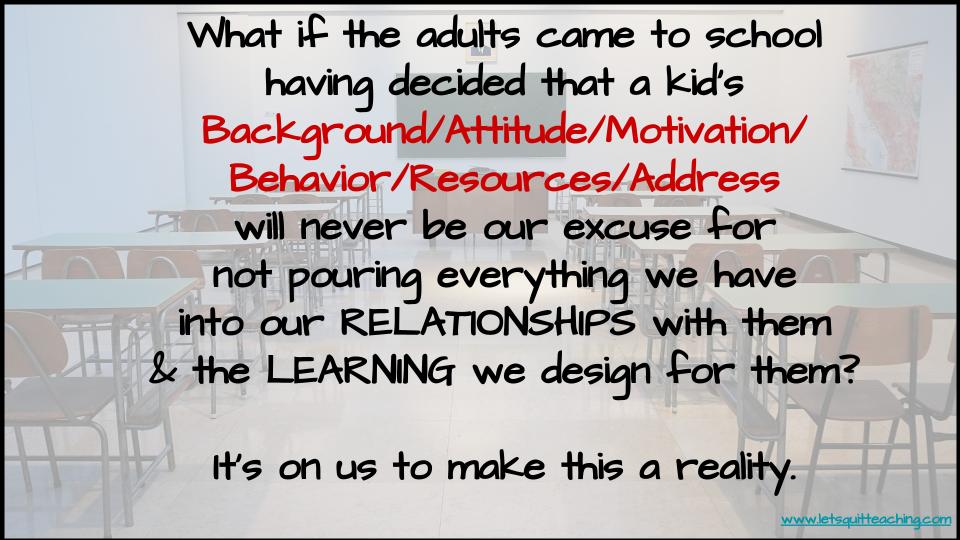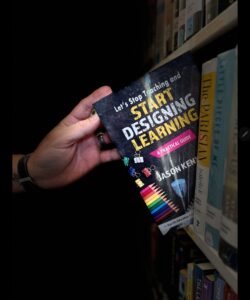If you search the internet for “copycat recipes” you will discover dozens of sites that basically take all our favorite things we eat or drink at national restaurant chains and supply the user with the copycat recipe verison of the item. I mean, who doesn’t want to sit at home and eat some hot Red Lobster cheddar biscuits in their sweatpants or make a gallon of Chick-fil-A sauce to put on anything you choose? I am amazed at the talent required to taste something and figure out what all the ingredients are to mimic the end product. I’m even more amazed when I see adults who have figured out what’s in the Secret Sauce of making a school THE place kids and teachers all want to be a part of and where learning is happening.
I recently visited the Ron Clark Academy in Atlanta, Ga. Many educators have walked the hallways of this school in awe at the architecture, decorations, special effects, etc you’ll see when you visit. I mean, what school do you know has a rotunda complete with a fire breathing dragon? There’s technology, field trips, cool student seating. Kids even get to eat two lunches during the day! But none of this stuff matters to the core recipe of their success. What they do, and what other successful schools do, is to constantly and consistently pour everything into 2 basic things: 1. Student Relationships and 2. Student Learning.
Relationships are the single most important and impactful factor in a successful school. Sure, research says it doesn’t rank as high as other qualities, but I would argue that without the relationships as the foundation, none of that other stuff that has impact can be built or be effective on student learning in the first place. Remember, you have to touch a kid’s heart before you can ever put anything into his head. If you want to be a part of a successful school, then get the adults in school to commit to building a relationship with ALL students. Even the ones that are more challenging to connect with. We have to be all in and commit to the idea that no matter a student’s behavior, address, background, attitude, resources, motivation or any other quality, that we will pour all we have into connecting with that student.
This requires you to love students. You don’t have to like them. I love my biological kids, but there have been times they have acted in ways making them hard to like. The same goes for my academic children. You have to be intentional with how you build these relationships. You have to make the time to have a conversation that isn’t about school. You have to make the choice to smile every time you see a kid. You have to make the enthusiasm happen when they enter the room. It’s hard. We’re tired. We’re overwhelmed. We’re stressed. But, we have to do it if we want a successful school.
The other ingredient in the sauce is learning. What I mean is real, relevant, rigorous learning in all classes, all day. Learning where classes are filled with the students asking questions, monitoring their learning, assessing their progress, reflecting on mistakes, revising their methods, seeking out resources. A lot of these actions are ones typically tackled by the adult in the room. But, whose learning is it after all? We have to make learning, not teaching, the star of the show. That requires a lot of pre-work on our part. We have to design the opportunities, tools and resources for all these to happen. We might try to go into a class and teach, hoping learning happens by default. But, we want to make impactful and intentional choices ahead of time with learning in mind, so we can see it happening by design.
That means every adult in the building is a part of the process. That means we all get together and synchronize our internal compasses to all point towards the same thing: what is best for students’ learning. All decisions are made with that in mind. Not what is most convenient for the adults or the school as a whole, but what is best for the learning we are providing for our students. That, after relationships, is what’s required of us if we want our school to be the success we all are seeking through strategies and professional learning and conferences. It all comes down to those 2 things in the sauce that is not so secret after all. Make student relationships matter and make student learning the center. Watch what happens next.


